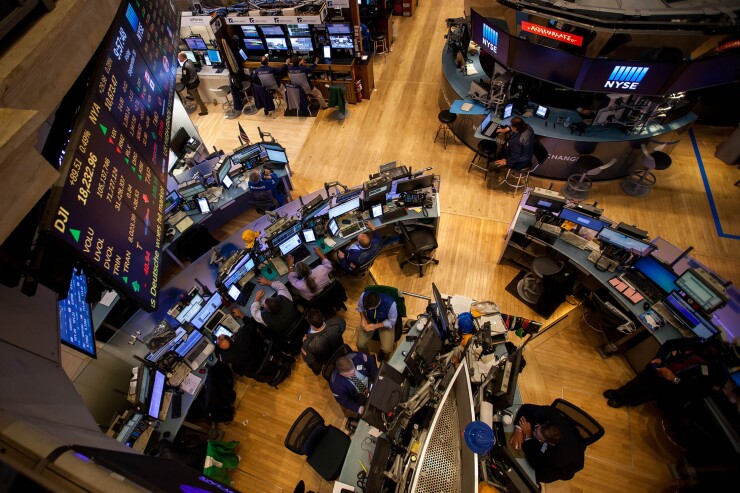Stop talking about the Trump trade dying. Cease the chatter about FAANG stocks booming.
This year's all about balance sheet risk.
Amid rising interest rates and growing corporate leverage, investors have cast aside debt-riddled companies in favor of cash-rich businesses, which include the FAANG stocks — Facebook, Amazon.com, Apple, Netflix and Google parent Alphabet, according to an analysis by Société Générale.
In other words, the move in the equity market isn't just a simple bid for growth. Rather, investors are showing that they're concerned about the amount of debt these firms are holding and whether they'll be able to pay it back.
If the stock market's right and companies with higher net debt are increasingly at risk, there's one rather large problem. The credit markets don't seem to care.

"In the U.S., it's very much so a balance sheet issue. It's disguised in the S&P 500 because these risky stocks are typically small, and the big guys are putting up the market right now," said Andrew Lapthorne, global head of quantitative strategy at the bank. "But credit markets are not bothered. The overconfidence may be misplaced."
Sorting stocks by balance sheet strength is akin to tracking high-yield credit spreads: both evaluate leverage risk. A correlation gauge between the two measures is at the lowest level in at least seven years, as investors shun debt risk in stocks while pumping up junk bond prices.
This kind of divergence is rare, and in this case will likely correct itself with a sell-off in lower quality bonds, Lapthorne said.
THE EVAPORATION OF VOLATILITY
Stocks in the S&P 500 that are strapped with the most net debt dropped 5% this year, according to a basket compiled by UBS, underperforming the broader gauge by nearly 14 percentage points. The same can't be said for bonds. On Friday, yields on Bloomberg Barclays U.S. Corporate High Yield index hit the lowest in nearly three years.
The disconnect between the two markets is partially due to the evaporation of volatility, Lapthorne said. Credit worthiness is judged by a mixture of debt levels, interest rates, asset prices and the reliability of those prices, he said. Though rising debt levels and interest rates might set off alarms, stock volatility measures near record lows make asset prices look sturdy. Thus, companies appear less likely to default, and investors keep snapping up junk bonds.
-
Non-U.S. purchases of municipal bonds are up 32% from 2014. But not everyone is impressed.
April 21 -
Market valuations are generally high this year partly due to a lack of rate increases, but fourth-quarter positioning can still present opportunities.
September 27 -
Will the rally continue, or are the winning ways of this asset class nearing an end?
September 9
"If you get a sustained move in volatility, a lot of these problems within the equity market are going to move into credit," Lapthorne said.
Pervasively low yields globally have also piqued investor demand for returns, triggering riskier debt deal frenzy. Lenders including Bank of America, Goldman Sachs and Morgan Stanley arranged about $434 billion of leveraged loans in the first three months of the year, the most for a quarter going back to at least 1999, according to data compiled by Bloomberg.
Amid the ups and downs of the bond markets, these funds attracted new investors.
"People are trying to get yields while we stay in this Goldilocks-type environment," said Andrew Brenner, head of international fixed income for National Alliance Capital Markets. "That's one of the things I'm fearful of. The overconfidence is the same overconfidence of June 2007, right before the times got bad."
To be sure, Brenner points to a lot of things that could move equity markets beyond balance sheets. He credits the stronghold Google and other large tech companies have on their industry, as well as political risks, for driving the divergence between growth and value stocks.
One area of the market that isn't immune from fear at the moment is small-caps. Because smaller companies usually are highly leveraged and lack the strong balance sheets of mega-cap stocks, an aversion to debt has caused them to lag, according to Lapthorne. The average net debt for Russell 2000 companies is $467 million, data compiled by Bloomberg show.
Meanwhile, most of the five FAANG stocks have more assets than liabilities, with average net debt at negative $60.9 billion.
"People think investors are buying Facebook, Amazon, Apple and Google because they're growth stocks, but they're full of cash and don't have a balance sheet risk," Lapthorne said. "If you're a pension fund, if you're risk adverse, you're better off buying the FAANGs with strong cash balances than a bunch of small caps which are highly leveraged."






